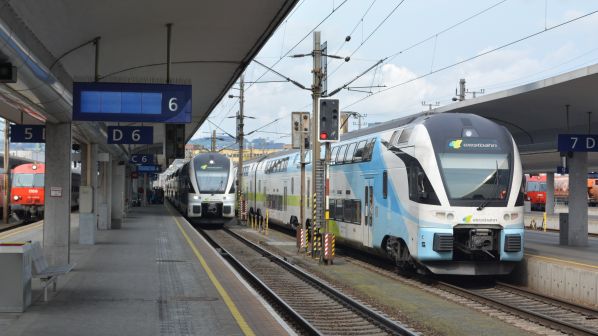WestBahn is selling its fleet of seven Kiss and 10 Kiss2 double-deck EMUs to German Rail (DB), with the first nine four-car class 4110 EMUs due to be handed over in December 2019 when WestBahn will also suspend its Vienna Floridsdorf - Salzburg service.
The operator intends to replace the fleet with 15 Stadler Kiss3 sets, which are due for delivery in 2021. WestBahn will then resume the Vienna Floridsdorf - Salzburg service.
WestBahn has so far accumulated a loss of €83m, partly due to costly financing agreements for the existing fleet.
The announcement on July 22 came less than two weeks after the European Court of Justice (ECJ) ruled in favour of the open-access operator, finding that station access is included in the “minimum access package” under which WestBahn operates.
Austrian infrastructure manager ÖBB Infrastructure had maintained that station fees were not included in the package and had to be purchased for each service WestBahn operated, a process that had been underway since 2012. WestBahn argued that station access was already included in the package under the first railway package.
AllRail claims WestBahn has faced numerous obstacles due to ÖBB being both the network and stations manager and the incumbent operator. It says ÖBB, which also receives an annual €600m directly-awarded subsidy from the national government, €350m from the regional governments and further unquantifiable amounts from Public Transport Authorities (PTAs), had been able to offer extremely low competing prices, while WestBahn was restricted by a lack of fair access to train paths, ticket retailing options and equal financing for rolling stock.
AllRail secretary general, Mr Nick Brooks, says the conditions that led to WestBahn’s decision to cut services could result in a reluctance to finance private rail enterprises in future.
“What kind of signal does it give to private investors if an independent operator that been operating for eight years loses €80m and now has to reduce its services?” he asked.
AllRail believes there is a serious risk that future market opening will never happen. “This is what happens when regulation that is intended to achieve a competitive single rail market in Europe gets watered down and the European Union pays too little attention to how it is implemented,” it said in a statement.
Following WestBahn’s announcement, ÖBB said it regretted the company’s decision and said the main competition was not between operators but between rail and road.
“If we want to achieve our climate goals in the coming years, we need more rail services and not less,” says ÖBB head of communications, Mr Sven Pusswald.
ÖBB said it is not aware of any market distortion, and maintained that it adheres to all legal requirements, in particular in regards to ticket pricing.

